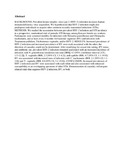Search
Now showing items 1-10 of 24
Rapid Decline in Risk of HIV-l Acquisition After Enrollment in a Vaccine Preparedness Cohort of Kenyan Prostitutes: Implications for the Design of HIV -1 Vaccine Efficacy Trials
(2002-02)
Background: In designing HIY-l vaccine efficacy trials, it will be important to accounrfor changes in HIY -1 incidence, especially changes over time and while participating in riskreduction programs.
Methods: Data from ...
Stabilised antenatal HIV-l seroprevalence in Nairobi, in the face of high population mobility: is age restriction now appropriate in screening?
(2003)
Abstract
Objectives: To measure HIV -1 seroprevalence in pregnant women in Nairobi.
Design: Six serial surveys were carried out between November 1991 and April 1997. Methods: Women attending four Nairobi City Council ...
Monthly antibiotic chemoprophylaxis and incidence of sexually transmitted infections and HIV-1 infection in Kenyan sex workers: a randomized controlled trial.
(2004-06)
CONTEXT:
Sexually transmitted infections (STIs) are common in female sex workers (FSWs) and may enhance susceptibility to infection with human immunodeficiency virus type 1 (HIV-1).
OBJECTIVE:
To examine regular ...
Prevalent herpes simplex virus type 2 infection is associated with altered vaginal flora and an increased susceptibility to multiple sexually transmitted infections.
(University of Nairobi, 2007)
BACKGROUND:
Prevalent herpes simplex virus type 2 (HSV-2) infection increases human immunodeficiency virus acquisition. We hypothesized that HSV-2 infection might also predispose individuals to acquire other common ...
The importance of core groups in the epidemiology and control of HIV-1 infection
(1991)
In Africa, HIV transmission occurs mainly through heterosexual intercourse. High-frequency transmitter core groups are key to the epidemiology of HIV-1 and STD on the continent. The rapid growth of the HIV-1 epidemic in ...
Isoniazid preventive therapy for tuberculosis in HIV-1-infected adults: results of a randomized controlled trial
(1997)
OBJECTIVES:
To determine the efficacy of isoniazid 300 mg daily for 6 months in the prevention of tuberculosis in HIV-1-infected adults and to determine whether tuberculosis preventive therapy prolongs survival in ...
Rapid progression to disease in African sex workers with human immunodeficiency virus type 1 infection
(1995)
From a cohort of female sex workers in Nairobi, Kenya, 163 women were observed to seroconvert to human immunodeficiency virus type 1 (HIV-1) and followed to study progression to HIV-1-related disease. The effect of several ...
Human immunodeficiency virus infection among high-risk seronegative prostitutes in Nairobi
(1993)
To determine the frequency and duration of antibody-negative human immunodeficiency virus (HIV) infection among heterosexually exposed African women, 56 HIV-seronegative female prostitutes in Nairobi were studied. Polymerase ...
Resistance to HIV-1 infection among African sex workers is associated with global hyporesponsiveness in interleukin 4 production.
(2001)
We previously identified HIV-1 resistant prostitutes who remain persistently HIV-1 PCR- and
antibody-negative despite continued heavy exposure to HIV-1 through sex work. We hypothesized
that differences in virus-specific ...
Stable antenatal HIV-1 seroprevalence with high population mobility and marked seroprevalence variation among sentinel sites within Nairobi, Kenya.
(1999)
Objectives: To monitor and analyse trends in HIV-1 seroprevalence among
antenatal women in Nairobi, Kenya.
Design: Six sequential surveys were carried out among antenatal clinic attenders at
four Nairobi City Council ...







